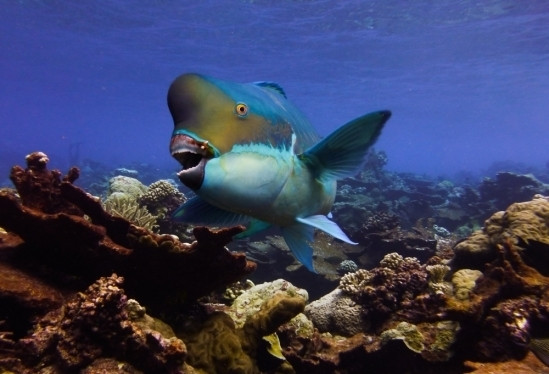Scientists have discovered that some fish 'farm' their food
Behaviour was documented at Palmyra Atoll in the middle of the Pacific Ocean.

Researchers have observed intriguing behaviour in type of fish in the central Pacific.
A team from the University of California Santa Barbara showed for the first time that Steephead parrotfish (Chlorurus microrhinos) rotationally harvest their favourite food – a fleshy kind of turf algae – and defend their feeding territory as they wait for stocks to replenish themselves. The findings were published in the journal Marine Ecology Progress Series.
"Herbivores are really important for coral reef ecology because there's a constant battle between coral and algae," said Peter Carlson, lead author of the paper. "Anything that can remove algae is essentially considered a net positive for coral growth."
Working on Palmyra atoll, around 1,000 miles south of Hawaii, the researchers became aware of the fish's farming habit when they noticed many bite marks in specific areas of algae growing on dead coral.
They began to observe these patches, noticing that parrotfish were feeding on them but were only targeting one small area of algae at a time. Once the algae, was finished they would allow the patch to recover before returning.
"The fish would come back to the same area and defend it against other individuals of the same species," Carlson said. "Essentially, they're farming by using their environment very strategically."
Fortunately for the coral, the parrotfish provide them with an important service. Turf algae can be very harmful to young corals. When the fish remove the algae from a certain area it gives tiny coral larvae a small window of opportunity to settle and grow.
"Our studies on Palmyra are providing information on a species whose abundance has been reduced greatly due to overfishing in most areas of the world," Jennifer Caselle, another author on the study, said. "Yet this is the type of fish that people want to bring back to help save coral reefs, so it's important to understand their behaviour."
© Copyright IBTimes 2025. All rights reserved.





















